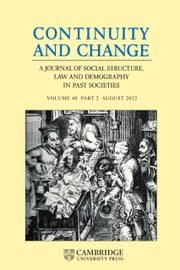Article contents
Micro-credit, misappropriation and morality: British responses to Irish distress, 1822–1831
Published online by Cambridge University Press: 29 January 2007
Abstract
This article charts the vicissitudes of an economic experiment that aimed to eradicate distress in early-nineteenth-century Ireland. The London Committee for Irish Relief was formed in 1822 and was the first large-scale, charitable response in Britain to famine conditions in Ireland. The Committee believed that poverty was the cause rather than the effect of ‘the Irish problem’ and tried to initiate change by providing the poor with financial resources. Despite some initial successes, allegations over misappropriation of funds created a climate of distrust about the Committee's policies. These allegations mounted over the decade, and when Ireland once again faced extreme distress, in 1831, they caused a rift in London's charitable circles, producing two organizations: the Irish Distress Committee, which argued that poverty was the causal factor, and the Western Committee for Irish Relief, which identified Catholicism as the source of Ireland's problems. This division reflected a more general loss of confidence in plans to solve Ireland's endemic poverty through the promotion of economic activity. These events coincided with hardening attitudes towards Catholics and the poor throughout the British Isles and played an important role in the development of policies on Irish relief in the nineteenth century.
- Type
- Research Article
- Information
- Copyright
- © 2006 Cambridge University Press
- 3
- Cited by


